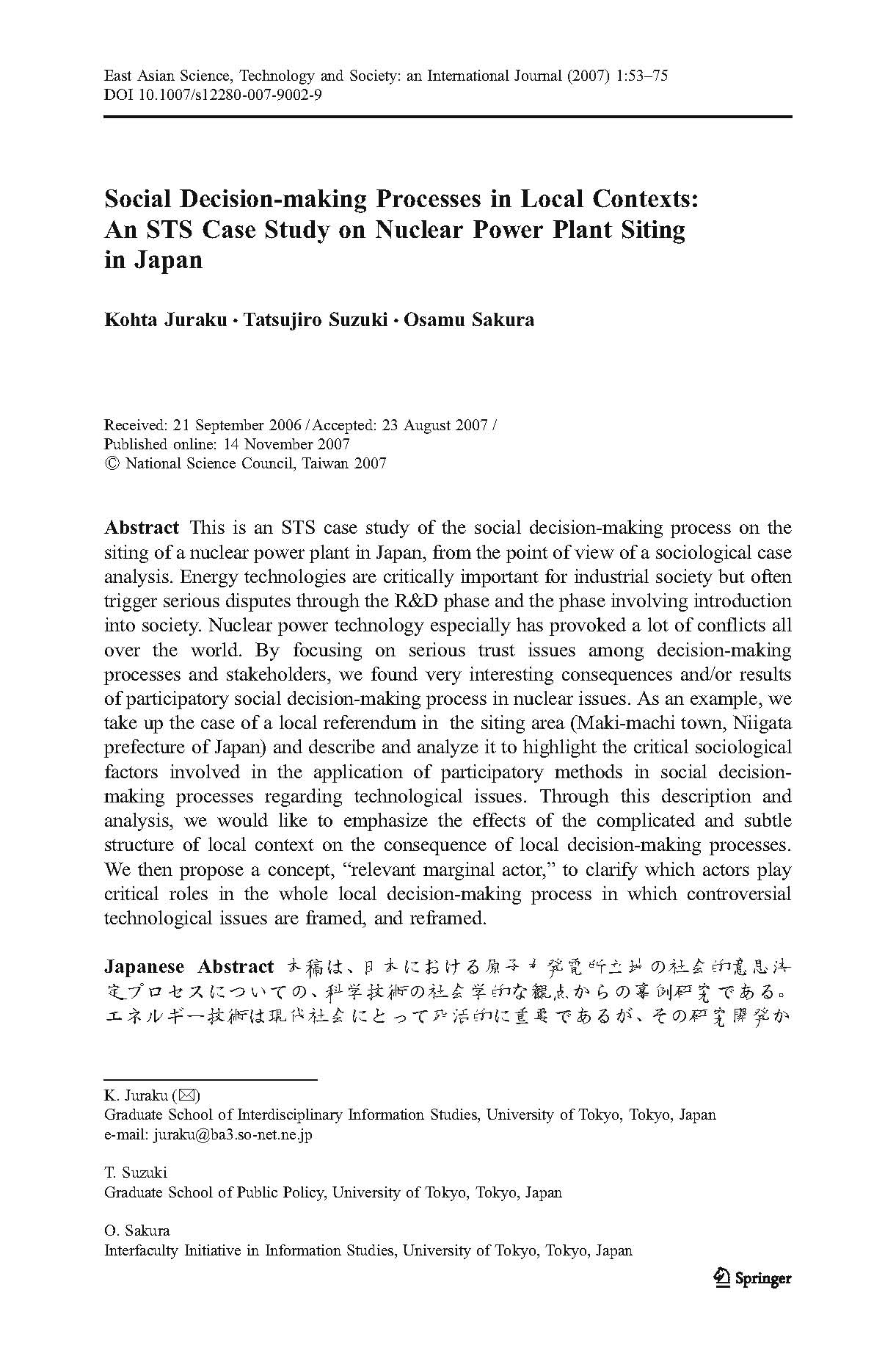Juraku, Kohta, Tatsujiro Suzuki, and Osamu Sakura. 2007. “Social Decision-making Processes in Local Contexts: An STS Case Study on Nuclear Power Plant Siting in Japan.” East Asian Science, Technology and Society 1 (1): 53-75. Available at http://www.springerlink.com/content/51243p18300u0n84/.
In contrast to the worries over the ongoing incident in Fukushima, a study on nuclear power plant siting in Maki-machi, Niigata provides some interesting if not optimistic insights regarding decision-making processes about nuclear energy in Japan. Published in East Asian Science, Technology and Society in 2007, Juraku, Suzuki, and Sakura’s article introduces how the Tohoku Electric Power Corporation canceled its Maki-machi nuclear power plant plan in 2003 due to a series of local efforts, including a citizen’s referendum, a mayoral recall election, and antinuclear residents’ acquisition of land in the proposed area. Teachers and students interested in public engagement with respect to nuclear power plant siting will appreciate the authors’ fascinating delineation of Maki-machi’s complex local political and social structure as well as numerous intriguing events regarding the debate over the proposed nuclear power plant from the 1970s to 2003.
Juraku, Suzuki, and Sakura characterize their article as a sociological STS case study. They propose the concept of “relevant marginal actor” to identify a group of Maki-machi residents that advocated a citizen’s referendum in 1995 and an ordinance-based referendum in 1996 to allow residents to express their opinion. As this referendum movement group owned a different public image from the existing political cliques and antinuclear groups, referendum advocates successfully settled the debate over the proposed nuclear power plant. For Juraku, Suzuki, and Sakura, the relevant marginal actors in Maki-machi made a breakthrough in a “deadlocked situation” which lasted since the early ‘80s.
The excerpt below illustrates an intriguing and dramatic event described in this article, which throws light on how the history of nuclear energy rests in the hands of citizens residing in these localities:
“In other words, a referendum would be never carried out as long as Mayor Sato was in office. …. Consequently, the referendum movement group began a campaign to recall the mayor. It seemed that it would be very difficult to collect the necessary number of signatures to call for a recall election because it was not anonymous. It was predicted that citizens would hesitate to reveal their names in public. But, contrary to this prediction, the required number of signatures was collected in just 2 weeks. Mayor Sato recognized he had lost, and on December 15, 1995, he resigned of his own will before the recall election.” (Juraku, Suzuki, and Sakura 2007, 63)
— Honghong Tinn
Chia-Ling Wu, of the EASTS editorial board, shares her Chinese annotation of this article:
EASTS的「科技的公民參與」創刊號裡,東大的日本學者壽樂浩太等人,針對日本新瀉縣卷町興建核能電廠所展開的公投過程,強調地方文化與地方政治結構,如何影響科技政策決定。他們提出「相關邊緣行動者」的概念,認為在此案例中,相關邊緣行動者特別能打破科技爭議的死結。這個案例也是日本核能爭議的重要案例。1990年代中期,當時新瀉縣卷町的市長支持蓋核電廠,可是反核人士反對,並要求地方公投,但是市長拒絕。在此反核擁核的爭議中,有一個平常不涉入雙邊政治的 Takaaki Sasaguchi 出面辦理市民公投(約兩萬多人的小鎮),以 求公投的公正。這位 Sasaguchi 是當地一家著名清酒釀造的老闆,並在下一次的選舉就當選成市長。當時於1995年所進行的公投,投票率八成八,五成四反對。期間又有日本著名的文殊電廠輻射事件,隔年又有阪神大地震,居民反核變強,但是擁核人士質疑地方公投的正當性,藉由打官司處理此爭議。Sasaguchi 市長開始把地方設施土地賣給支持其反核政策的人士,但是擁核與東北電力仍透過各種行政官司上訴,其中也有些敗訴。總之結果是2003年東北電力撤銷了這次的建核案。對於日本民間如何以政治行動處理核電廠爭議,這篇論文提供了一個精彩的案例。— Chia-Ling Wu
For a Japanese abstract of this article, see EASTS.
Further readings:
Fujigaki, Yuko, 2009. “STS in Japan and East Asia: Governance of Science and Technology and Public Engagement.” East Asian Science, Technology and Society 3(4): 511-518. link
Fujigaki introduces an STS textbook chapter aiming to teach STS concepts by using the Monju Nuclear Power Plant Incidents in 1995.
Chen, Dung-Sheng and Chia-Ling Wu, eds. 2007. East Asian Science, Technology and Society 1 (1), a special issue on public participation in science and technology in East Asia. link
As Juraku, Suzuki, and Sakura’s article appears in this special issue, teachers and students may find its other articles helpful.
![[Teach311 + COVID-19] Collective](https://blogs.ntu.edu.sg/teach311/files/2020/04/Banner.jpg)